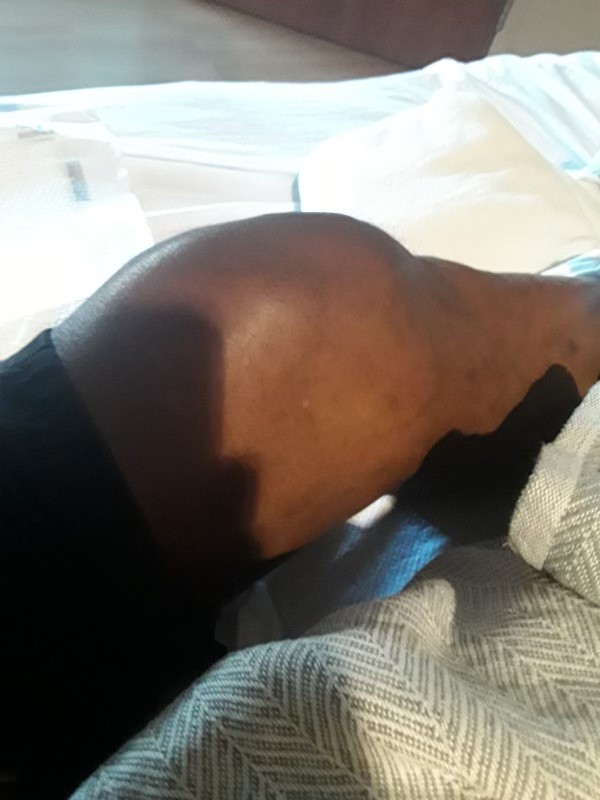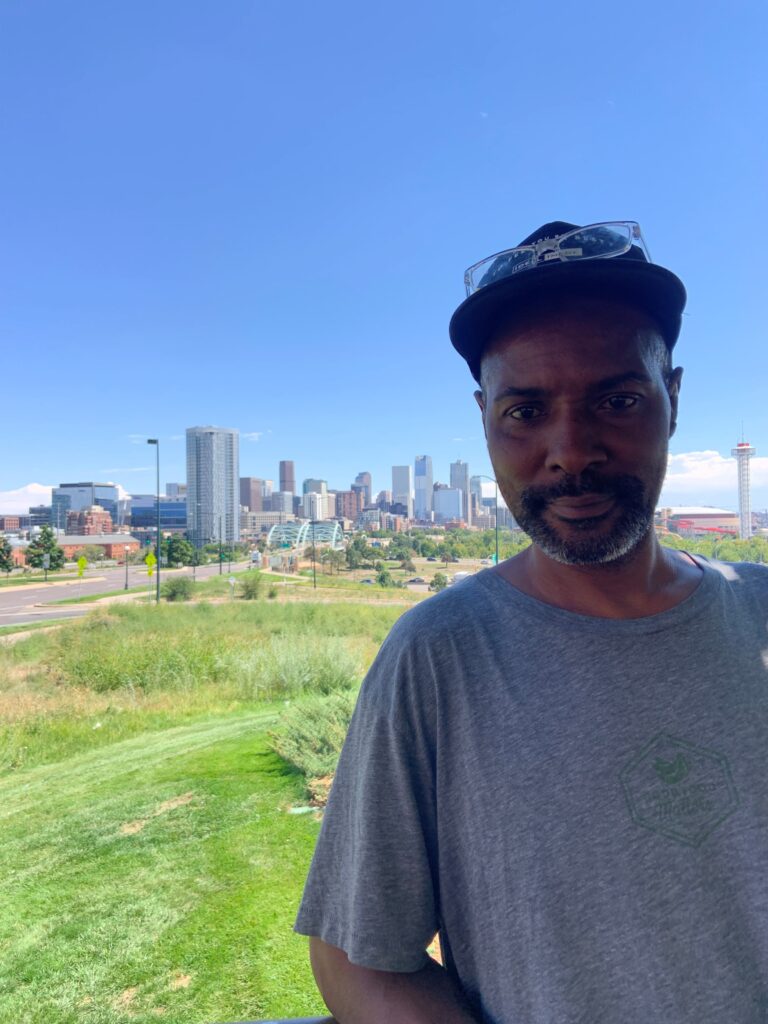

Overview:
This week a houseless HAND member was discharged from two hospitals to the streets without any treatment or respite plan in spite of a tibial plateau fracture and broken ankle. He’s been denied treatment/surgery time and time again due to risks associated with living at shelters. He was further denied a respite bed as the program does not allow anyone with a felony – even a 30 year old felony – due to zoning law. He was kicked to the streets in a wheelchair, judged for being houseless, and thus treated as dispensable… As so many are. Keith’s trying situation underlines Denver’s need for effective case management, unbiased medical professionals, accessible respite programs, and of course, housing and hygiene access for all.
Details:
HAND cannot stay silent about the medical neglect reported by one of our valued outreach team members. Keith Barhams has been one of HAND’s most consistent members since mid March and has shared the various barriers he faces when trying to get critical medical care in Denver. In the words of a Colorado Coalition of the Homeless (CCH) representative, this individual case “fits the description of so many of our outreach clients,” and thus highlights the extreme injustice and lack of support for our unhoused neighbors.
On Friday October 21st, Keith Barhams found himself in an accident while riding an electric scooter, a purchase made to better his life and offer a financial opportunity through food delivery. The accident left him with a painfully swollen knee. This would be diagnosed the next day at St. Joseph’s Hospital as a tibial plateau fracture, an injury which most people would have surgery for, followed by 6 weeks of rest without any weight being put on the injury. Keith, by condition of being a black houseless man, did not receive that consideration.
After receiving the diagnosis Saturday and until Sunday morning, Keith was kept on a steady drip of strong opiates. On Sunday he was told he’d be discharged and nothing more could be done for him. He reached out to advocates at Housekeys Action Network Denver (HAND), who then connected with District 9 Candi Cdebaca’s office, and calls were made to the hospital advocating for extended stay until a treatment plan and place of respite could be decided. Keith was then told he could stay until Thursday the 27th pending a respite spot at CCH’s Beacon Place. On Monday it was discovered that Keith did not qualify due to a ZONING issue that the respite building has which requires background checks, and a felony from 30 YEARS AGO prohibited him from the program. Without a statute of limitations in this case, a criminal record, regardless of how old it is, prevents people from receiving much needed medical treatment and care. Rather than seek other respite options, St. Joseph’s once again attempted to discharge him prematurely.
HAND then communicated again with St. Joseph’s case management and one other referral option – RecoveryWorks – was explored. This turned out not to be possible due to the 16 stairs leading to their respite rooms. The case manager insisted that the only remaining option was for Keith to wait in line first thing Tuesday morning at Salvation Army Crossroads in case a bed might become available. Although the doctor originally said there was nothing beyond discharged that could be done for Keith, it turned out that this was due to a health insurance issue, and referral for surgery through Denver Health Orthopedics was the next treatment step. We then asked that before he leave on Tuesday morning, he should meet with the case manager to schedule that surgery in case his phone is lost or stolen at the shelter, a common occurrence in shelters. At around 5:40pm on Monday, the case manager agreed and said she’d let her colleague know to do so tomorrow.
We were told that their shift started at 8am. HAND called at 8:07am to follow-up with the case manager, only to discover that Keith had already been handed discharge paperwork. It took many calls and many transfers to find out several things:
- First a floor nurse told HAND that Keith’s chart was not coded in the discharge color and there was not a discharge order.
- The case manager hadn’t shown up by 8:30am, let alone talked to Keith.
- The nurse who performed the discharge said there were not updated notes about the plan discussed Monday evening, and no follow-up plan was set beyond providing him with a walker and wheelchair. No transportation was offered either.
- By 8:38am, the attending physician told HAND that Keith had “behavioral issues” and was “not a child” so did not need assistance to schedule the surgery, but since HAND insisted, she would ask a nurse to “watch him make the call himself” to schedule the appointment. She insisted multiple times that Keith was still at the hospital, when HAND knew from Keith just minutes earlier that he was in fact NOT at the hospital at all, but had picked up his prescriptions and rolled his way to a bus stop off Colfax and was waiting for the 15 bus. The physician then hung up on HAND, refusing to hear them say he was no longer there.
- The physicians also prescribed Narcan alongside pain medication without possible refills under the false assumption that Keith was at risk of overdosing – highlighting the discriminatory lens through which they treated him, as he does not partake in opiates whatsoever and in fact expressed concerns about the medical professionals’ intention to keep him “doped up” enough to feel physically fit to leave the hospital on his own accord with a broken knee.
- Later on, imaging at Denver Health would reveal that St. Joseph’s completely missed a broken ankle on the same leg.
Keith’s discharge paperwork stated “Schedule an appointment with Denver Health Orthopedics as soon as possible for a visit in 1 day (around 10/25/2022)”. When called, the scheduling person stated that St. Joseph’s Hospital never submitted the referral, which could help him be seen sooner, and the hospital should’ve called them first to ask about capacity. The soonest they could see Keith would be November 8th, in 2 weeks. The staff person suggested that this was insufficient given Keith’s houseless status and the risks associated with not being seen for surgery soon enough, so he recommended that he go to Denver Health’s urgent care immediately instead.
The truth is that this has been the latest example of systemic failures that has prevented Keith from being treated for various conditions on many occasions. His severe psoriasis on his hands and feet that have caused him a great deal of discomfort and worsened over the years could be treated with surgery, but he has been denied by medical professionals saying that being houseless and/or living at shelters is too high-risk for infection post-operation. Mid-late September, after being involved in a hit-and-run by an SUV while on his bike, he suffered broken ribs, cracked top front teeth, and a massive hematoma the size of half a basketball on his left hip, affecting his mobility, and was told by professionals that they would not attempt to treat his hip due to him being houseless and high-risk for infection. All this alongside having suffered a heart attack from the stressful conditions experienced on the streets
If medical professionals refuse to ease his pain with proper medical treatment because being houseless is too high-risk, then that is a serious problem, and one to reflect on as a society. Are we really allowing the poor in our country to suffer without medical treatment that is available to others? Do we stand by and let them be broken down time and time again, physically deteriorating as they lose trust in the system enough to stop seeking support from medical institutions?
The Mayor’s proposed 2023 City Budget increases police funding by an additional approx. $43 million while the Office of Housing and Stability (HOST) is only receiving an additional $2 million from the general fund. After Keith was hit by the SUV, no investigation was done into the hit and run. Instead, he was interrogated and lied to by police officers while in the hospital with broken ribs and internal bleeding as they saw him as just another black houseless man and arrested him – interrupting the treatment and taking him directly to jail – on little to no evidence for a crime he didn’t commit. When his name was cleared just a few days later, after the actual perpetrator confessed, he was sent back to the streets, having had no opportunity or support with seeking respite or continued treatment for his injuries.
Why are we funding a police force that continues to oppress its poor racial minorities instead of providing safe shelter in the form of housing? Increasing the community’s safety happens when all have equal access to effective medical treatment and all have equal access to housing to allow for healing.
Here are a few of the “what-ifs?” that HAND asks when imagining a world that values all life, a society where Keith wouldn’t feel as though he’s seen as “nothing to noone”:
• If St. Joseph’s had made sure he had a plan in place before discharging him back to the streets, including calling to refer him for needed orthopedic surgery, then they could’ve arranged transportation between the hospitals and allowed him to continue care in a safe environment instead of waiting outside in line at the chance of being allowed stay at a shelter deemed too high-risk for treatment.
• If there wasn’t an outdated zoning code at the only CCH respite location that St. Joseph’s normally refers to, then a criminal record from 1992 would not have prevented him from having a safe place to undergo and recover from surgery as needed.
• If Keith hadn’t been stereotyped during his brief hospital stay, then he’d have had a proper treatment plan beyond continual opiate use and Narcan overdose reversal with no safe place to await surgery. They also could have noticed his broken ankle at the first assessment.
• If Keith had housing in the first place, then he likely would not have suffered back-to-back health emergencies, interrupting one recovery process with further physical, mental, and emotional trauma, and ultimately costing the city more funding in emergency response.
Currently Keith is being observed overnight at Denver Health, having been told most recently that his surgeries are likely to be outpatient with no sure respite plan to keep weight off his injuries. If you’d like to offer support, please do not hesitate to reach out to HAND at this critical time.

Housekeys Action Network Denver
Towards rights, dignity, housing…
email info@housekeysactionnetwork.com
phone 701-484-2634



Leave a Reply
You must be logged in to post a comment.